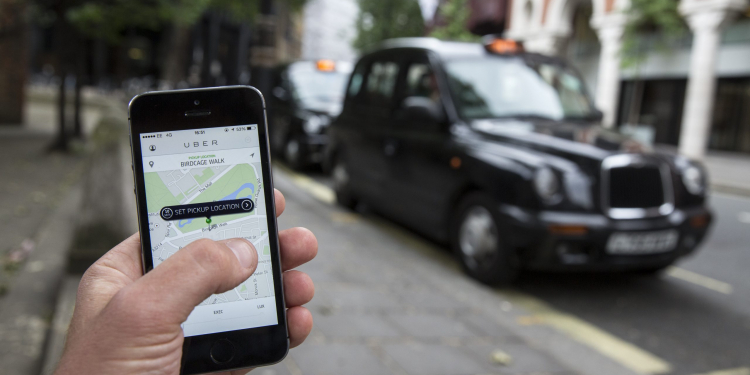The FINANCIAL — Uber won an appeal to continue operating in London on Monday when the judge restored its transportation license. Judge Tan Ikram said that he had “sufficient confidence” Uber “no longer poses a risk to public safety.” A ban would have been a huge hit for the company as its revenue declined 29% in Q2. In November of 2019 TfL did not renew Uber’s license as it has identified a pattern of failures by the company including several breaches that placed passengers and their safety at risk. Uber’s new London license will last 18 months and comes with several conditions jointly agreed by Uber and Transport for London (TfL).
Uber has won the right to continue operating in London, a crucial market for the company. A UK judge upheld the company’s appeal on Monday against a decision by the local transportation regulator in November 2019 to strip Uber of its ride-hailing license over safety concerns. Uber (UBER) “does not have a perfect record but it has been an improving picture,” Judge Tanweer Ikram said in his ruling. “I am satisfied that they are doing what a reasonable business in their sector could be expected to do, perhaps even more.” London is one of the world’s most important cities for Uber. 3.5 million Londoners regularly use its app and it claims 45,000 drivers in the capital, as reported by CNN.
The ruling is a step forward for Uber as the company tries to build trust with regulators after years of tussles in London and elsewhere. Under co-founder and former Chief Executive Travis Kalanick, who resigned as CEO in 2017 and left the board late last year, Uber regularly tested the regulatory and legal envelope of countries where it operated in order to speed growth. The company’s stock jumped almost 6% on premarket trading, The Wall Street Journal wrote.
A ban would have been a major blow for the company whose ride-hailing service helped remake urban transportation but now faces growing financial and regulatory challenges around the globe. Uber was facing major financial losses even before the coronavirus led to a major decline in rides, but the pandemic has had a crippling effect on Uber’s business, according to The New York Times.
In August of 2020 Uber Announced Q2 results. The company reported that the revenue declined 29% year-over-year, or 27% on a constant currency basis. Mobility Revenue declined 67% year-over-year and Delivery Revenue grew 103% year-over-year. Gross Bookings declined to $10.2 billion, down 35% year-over-year, or 32% on a constant currency basis, with Mobility Gross Bookings declining 73% and Delivery Gross Bookings growing 113% year-over-year, each on a constant currency basis.
Last year, Transport for London (TfL) stripped Uber of its license for a second time — it first declined to renew Uber’s London license in 2017 — citing a “pattern of failures” that had put passengers at risk. The watchdog said a glitch in Uber’s systems allowed unauthorized drivers to upload their photos to other driver accounts and fraudulently pick up passengers. Handing down his decision at the Westminster Magistrates’ Court on Monday, Judge Tan Ikram said he had “sufficient confidence” Uber “no longer poses a risk to public safety.” Uber’s new London license will last 18 months and comes with several conditions jointly agreed by Uber and TfL, as reported by CNBC.
In November of 2019 TfL did not renew Uber’s license as it has identified a pattern of failures by the company including several breaches that placed passengers and their safety at risk. A key issue identified was that a change to Uber’s systems allowed unauthorised drivers to upload their photos to other Uber driver accounts. This allowed them to pick up passengers as though they were the booked driver, which occurred in at least 14,000 trips – putting passenger safety and security at risk. This means all the journeys were uninsured and some passenger journeys took place with unlicensed drivers, one of which had previously had their license revoked by TfL. Another failure allowed dismissed or suspended drivers to create an Uber account and carry passengers, again compromising passenger safety and security.
It is interesting to note that the first branded Uber Boat by Thames Clippers set sail on the River Thames on August the 3rd, marking the start of a partnership between Uber and Thames Clippers. A fleet of 20 boats on the River Thames, with departures from 23 piers across London from Putney in the west to Woolwich Royal Arsenal in the east, will help commuters travel into the city in space and comfort. Over 4.3m people use the River Thames for commuting and leisure trips each year on the Thames Clippers network.
Uber announced its partnership with Thames Clippers in early July, which will see river boats emblazoned with Uber branding and passengers able to buy tickets directly through the Uber app. The payment will be processed using Uber account details and passengers will then be able to use QR technology to board. The service is still operated in full by Thames Clippers and the multi-year partnership will see passengers being able to board one of the boats at any of the 23 piers from Putney to Woolwich Arsenal, as reported by Evening Standard.





























Discussion about this post